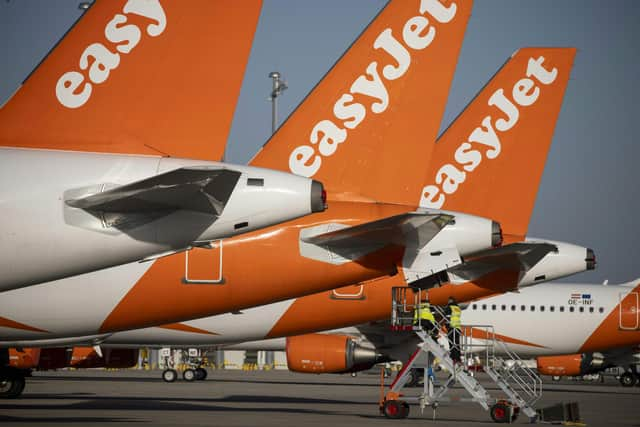Is EasyJet set to gain altitude - or will it be stymied by variant headwinds?
The airline group has suffered a turbulent 12 months on the back of fluctuating travel restrictions across Europe, which caused the business to cut flight numbers heavily as holidaymakers stayed in the UK.
Bosses will be looking to reassure investors this week that plans to ramp up flights will go ahead. In a trading update last month, the group said pre-tax losses for the 12 months to September were expected to be between £1.13 billion and £1.17bn, slightly lower than analyst predictions.
Advertisement
Hide AdAdvertisement
Hide Ad

Chief executive Johan Lundgren said a surge in demand across Europe and a return of bookings to winter sun destinations like Egypt and Turkey had allowed it to ramp up flight capacity to nearly 60 per cent of pre-pandemic levels.
He said: "October half-term bookings have been strong, particularly to the Canary Islands, where we have increased our capacity to around 140 per cent of full-year 2019 levels."
But investors will be eager to hear whether plans to increase capacity to 70 per cent of pre-pandemic levels will go ahead as fears rise over a new Covid variant and potential return of travel restrictions in the UK.
Russ Mould, investment director at AJ Bell, said the new variant was "the worst possible news for airline operators" as they were starting to see a rebound in demand.
He said: "These companies have been under significant financial stress and will want to avoid having to go back to shareholders yet again to ask for more money to help see them through bad times, should we get new widespread travel restrictions."
Any such limits will be beyond the control of bosses, but investors will be on tenterhooks for reassuring noises as to how EasyJet could mitigate the impact of further disruption to flights.
Also commenting was Sophie Lund-Yates, equity analyst at Hargreaves Lansdown, who said the airline’s performance “perked up” in the fourth quarter, when it flew 58 per cent of its total capacity, “and we’d like some detailed ideas” of when that will return to normal levels. “With new Covid variants on the rise, that might not be as soon as we’d hoped.”
A message from the Editor:
Thank you for reading this article. We're more reliant on your support than ever as the shift in consumer habits brought about by coronavirus impacts our advertisers.
If you haven't already, please consider supporting our trusted, fact-checked journalism by taking out a digital subscription.
Comments
Want to join the conversation? Please or to comment on this article.
